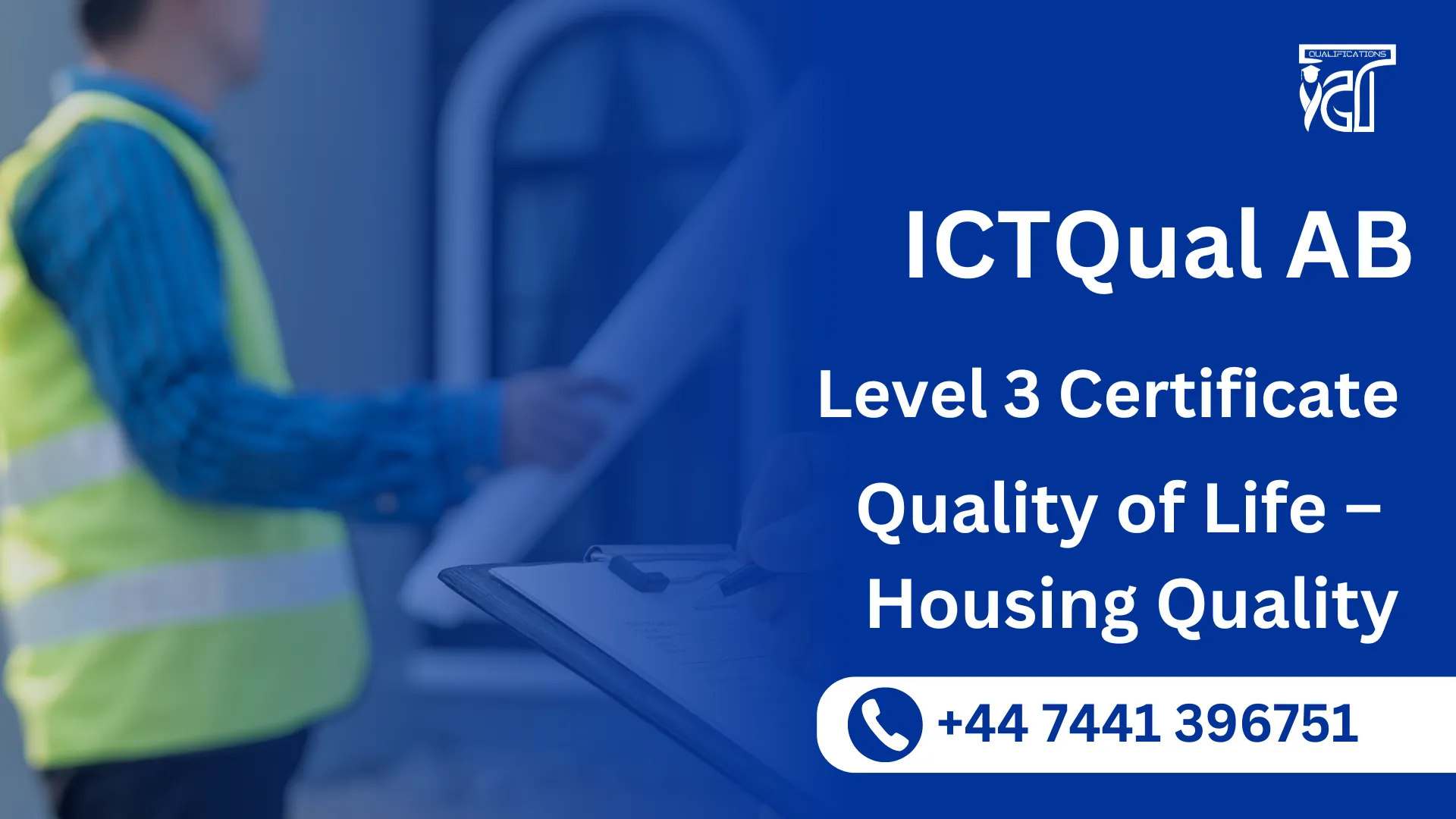The ICTQual AB Level 3 Certificate in Quality of Life – Housing Quality is designed to explore the critical role that housing plays in shaping overall well-being. Safe, secure, and well-maintained housing is not only a basic necessity but also a cornerstone of social stability, health, and personal development. This course provides learners with a structured understanding of how housing quality impacts individuals, families, and communities, linking physical living conditions to broader measures of quality of life.
Learners will examine the key dimensions of housing quality, including safety standards, environmental sustainability, affordability, and accessibility. The program emphasizes both theoretical frameworks and practical applications, enabling participants to analyze housing conditions and propose improvements that enhance comfort, security, and long-term value. By engaging with real-world examples and case studies, learners will gain insights into how housing policies and practices influence social equity and community development.
A distinctive feature of this course is its focus on the intersection between housing quality and public health. Participants will explore how factors such as ventilation, sanitation, space, and structural integrity contribute to physical and mental well-being. The curriculum also highlights the importance of housing in fostering social inclusion, reducing inequalities, and supporting economic stability. This holistic approach ensures that learners appreciate housing not just as a physical structure, but as a vital determinant of life quality.
Ultimately, the course prepares learners to contribute meaningfully to housing-related initiatives, whether in policy, planning, or community development. It is suitable for individuals seeking to enter or progress within fields such as social services, urban planning, real estate, or public health. By the end of the program, participants will have developed both the knowledge and the professional mindset required to evaluate housing quality and advocate for improvements that enhance the lives of individuals and communities.
ICTQual AB Level 3 Certificate in Quality of Life – Housing Quality
This qualification, the ICTQual AB Level 3 Certificate in Quality of Life – Housing Quality, consists of 3 mandatory units.
| Sr# | Unit Title |
| 1 | Foundations of Housing and Quality of Life |
| 2 | Housing Standards, Safety, and Sustainability |
| 3 | Community Development and Housing Policy |
Learning Outcomes for the ICTQual AB Level 3 Certificate in Quality of Life – Housing Quality:
Foundations of Housing and Quality of Life
By the end of this unit, learners will be able to:
- Define the concept of housing quality and explain its relationship to overall wellbeing.
- Analyse how housing conditions influence physical health, mental health, and social stability.
- Identify the role of safe, affordable, and accessible housing in improving quality of life.
- Evaluate the cultural and social significance of housing in different communities.
- Reflect on personal and community experiences of housing and their impact on wellbeing.
- Apply theoretical frameworks to assess the importance of housing in human development.
Housing Standards, Safety, and Sustainability
By the end of this unit, learners will be able to:
- Explain the importance of housing standards and regulations in ensuring safety and wellbeing.
- Analyse the impact of poor housing conditions on health, safety, and community outcomes.
- Demonstrate understanding of sustainable housing practices and their long‑term benefits.
- Evaluate the role of building codes, safety measures, and environmental considerations in housing quality.
- Reflect on the ethical responsibilities of housing providers and policymakers.
- Propose strategies for improving housing safety, accessibility, and sustainability.
Community Development and Housing Policy
By the end of this unit, learners will be able to:
- Explain the relationship between housing policy, community development, and social wellbeing.
- Analyse how government policies and urban planning influence housing access and quality.
- Evaluate the role of NGOs, local authorities, and international organisations in housing development.
- Demonstrate understanding of housing as a driver of social inclusion and economic stability.
- Reflect on global challenges such as homelessness, urbanisation, and housing inequality.
- Apply knowledge to propose strategies for inclusive, fair, and sustainable housing policies.
This course is designed to highlight the vital connection between housing quality and overall quality of life. It equips learners with the knowledge and skills to assess housing standards, understand their impact on health and well-being, and contribute to sustainable community development. By focusing on both practical and theoretical aspects, the program prepares participants to make meaningful contributions in housing-related fields and professional roles.
1. Understanding Housing as a Determinant of Well-Being
- Gain insights into how housing quality directly impacts physical, mental, and social health.
- Learn to connect housing conditions with broader measures of quality of life.
- Explore the role of housing in fostering stability, security, and personal development.
- Understand the importance of safe, affordable, and accessible housing in modern communities.
- Develop awareness of housing as a key factor in social equity and inclusion.
2. Practical Skills for Housing Assessment
- Acquire the ability to evaluate housing quality using structured frameworks and standards.
- Learn to identify issues related to ventilation, sanitation, safety, and structural integrity.
- Engage with case studies and real-world examples to apply theoretical knowledge.
- Build skills to propose practical improvements that enhance comfort and long-term value.
- Strengthen analytical and problem-solving abilities in housing-related contexts.
3. Contribution to Policy and Community Development
- Understand how housing policies influence social outcomes and community well-being.
- Gain knowledge to support initiatives that reduce inequalities in housing access.
- Learn to advocate for sustainable and inclusive housing practices.
- Explore the intersection of housing quality with public health and economic stability.
- Contribute meaningfully to projects aimed at improving living standards.
4. Career and Professional Growth
- Enhance employability in fields such as social services, urban planning, real estate, and public health.
- Build competencies valued by organizations working in housing development and community welfare.
- Position yourself for roles that involve housing evaluation, policy support, or community engagement.
- Use this qualification as a pathway to advanced study in housing, social policy, or quality of life programs.
This course is designed for individuals who want to understand the vital connection between housing quality and overall well-being. It is suitable for learners who are motivated to explore how safe, affordable, and sustainable housing contributes to health, social equity, and community development. The program emphasizes both practical and theoretical knowledge, making it ideal for participants who wish to apply housing quality principles in professional, social, or policy-related contexts.
1. Aspiring Housing and Community Development Professionals
- Individuals seeking foundational knowledge in housing quality and its impact on quality of life.
- Learners motivated to enter fields such as urban planning, social services, or housing policy.
- Those interested in contributing to projects that improve living standards and community well-being.
- Participants who want to understand housing as a determinant of health and social stability.
- People looking for a recognized qualification to support career entry or progression.
2. Early-Career Employees and Practitioners
- Professionals working in entry-level roles in housing, construction, or community development.
- Employees aiming to strengthen their expertise in housing evaluation and quality standards.
- Those interested in developing transferable skills in analysis, communication, and problem-solving.
- Learners who wish to align their work with sustainable and inclusive housing practices.
- Individuals seeking to enhance employability by demonstrating specialized knowledge.
3. Social Policy and Public Health Enthusiasts
- Learners interested in exploring how housing quality influences public health outcomes.
- Those motivated to understand the link between housing, equity, and social inclusion.
- Participants keen to apply housing knowledge to broader social development initiatives.
- Individuals who want to advocate for improved housing standards in their communities.
- People aiming to integrate housing quality into public health and welfare strategies.
4. Career-Focused Learners
- Professionals aiming to progress into supervisory or managerial positions in housing or social services.
- Learners who want to use this qualification as a stepping stone to advanced study in housing or quality of life programs.
- Individuals seeking to broaden their career opportunities across multiple industries.
- Those motivated to develop a professional mindset alongside technical and social responsibility.
- Participants committed to continuous learning and long-term career growth.
Completing the ICTQual AB Level 3 Certificate in Quality of Life – Housing Quality provides learners with a strong foundation in understanding how housing standards influence well-being, social equity, and community development. This qualification opens doors to advanced study, specialized training, and diverse career opportunities in housing, social services, and public health.
1. Academic and Professional Advancement
- Progress to higher-level qualifications such as the ICTQual AB Level 4 Diploma in QA/QC or related housing and social policy programs.
- Pursue advanced diplomas in community development, urban planning, or housing management.
- Explore specialized certifications in housing quality, sustainability, or public health.
- Gain eligibility for training in international housing standards and compliance frameworks.
- Build a pathway toward leadership-focused qualifications in housing and quality of life studies.
2. Career Development Opportunities
- Enter roles in housing evaluation, community development, or social services.
- Strengthen employability in sectors such as urban planning, real estate, and public health.
- Position yourself for roles that combine housing quality assessment with policy or advocacy work.
- Develop skills that support progression into supervisory or team-lead positions.
- Enhance prospects for cross-functional roles linking housing, health, and social equity.
3. Industry-Specific Pathways
- Apply knowledge in industries where housing quality is central to well-being, such as construction, real estate, and social housing.
- Support organizations in maintaining housing standards that improve community living conditions.
- Contribute to projects focused on sustainable housing and inclusive urban development.
- Gain opportunities to work with NGOs, government agencies, or housing authorities.
- Explore consultancy roles advising on housing quality and community welfare strategies.
4. Long-Term Growth and Specialization
- Use this qualification as a stepping stone toward advanced study in housing policy, social development, or public health.
- Build expertise that supports progression into management-level positions in housing and community services.
- Develop transferable skills that allow movement into related fields such as sustainability, compliance, or social planning.
- Prepare for continuous professional development through lifelong learning and industry certifications.
Entry Requirements
Learners must meet the following criteria to be considered for admission into the course:
- Age Requirement: Learners must typically be 18 years of age or older at the time of enrolment
- Educational Background: Completion of secondary school education or an equivalent qualification is required. No prior technical or industry-specific qualification is mandatory.
- Work Experience: While not compulsory, 6–12 months of exposure to relevant fields is highly beneficial. Suitable experience may include roles in housing services, construction, urban planning, or social welfare.
- English Language Proficiency: A good command of English is required to understand course materials and assessments. Recommended proficiency level: CEFR B1 or equivalent.
Register Now
Qualification Process
Qualification Process for the ICTQual AB Level 3 Certificate in Quality of Life – Housing Quality
- Self-Assessment:
Begin by evaluating your eligibility to ensure you meet the qualification requirements, including work experience, knowledge, and language proficiency. - Registration:
Complete your registration by submitting the required documents, including a scanned copy of a valid ID, and paying the registration fee. - Induction:
An assessor will conduct an induction to confirm your eligibility for the course and explain the evidence requirements. If you do not meet the criteria, your registration will be cancelled, and the fee will be refunded. - Assignments & Evidence Submission:
Provide all assignments and the necessary evidence based on the assessment criteria outlined in the course. If you are unsure of the required evidence, consult with the assessor for guidance on the type and nature of evidence needed. - Feedback and Revision:
The assessor will review your submitted evidence and provide feedback. Evidence that meets the criteria will be marked as “Criteria Met,” while any gaps will be identified. You will be asked to revise and resubmit if needed. - Competence Evidence:
Submit final evidence demonstrating that all learning outcomes have been met. This evidence will be marked as “Criteria Met” by the assessor once it is satisfactory. - Internal Quality Assurance (IQA):
The Internal Quality Assurance Verifier (IQA) will review your evidence to ensure consistency, quality, and compliance with standards. - External Verification:
The IQA will submit your portfolio to ICTQUAL AB External Quality Assurance Verifiers (EQA) for final confirmation. The EQA may contact you directly to verify the authenticity of your evidence. - Certification:
Upon successful completion of all checks, ICTQUAL AB will issue your official certificate, confirming that you have attained the ICTQual AB Level 3 Certificate in Quality of Life – Housing Quality.







